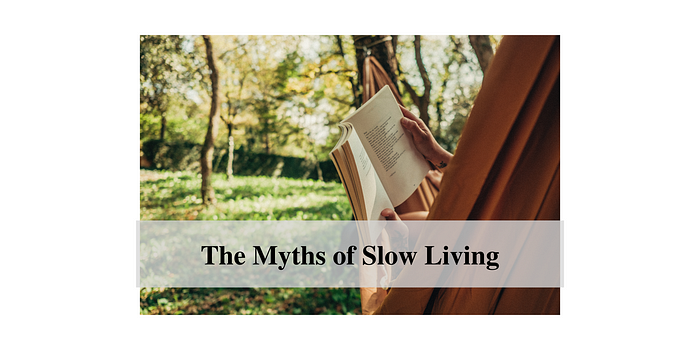The Myths of Slow Living

Slow living is a mindset where you create a more meaningful and conscious lifestyle. You live by doing what you value the most in life. Slow living encourages you to live in self-awareness and make purposeful decisions for the benefit of your own well-being and people you care for.
Most people are living in busy and hectic lifestyle. For them it is the definition of successful life and that they are an important person. However, for people who admire slow living lifestyle, being busy all day long doesn’t mean you are living a successful life. It’s also doesn’t mean you are an important person just because you are busy doing things the whole day.
Slow living denies that being busy equal to being successful or important, both at work and outside of your work circle. But, slow living is not about living at the snail’s pace either. It means to live with purpose and not living up to someone else’s idea of success. It is about living up to your own idea of success and what is most important to you.
Be a curator of your life. Slowly cut things out until you’re left only with what you love, with what’s necessary, with what makes you happy. — LEO BABAUTA
Slow living is all about creating time and space and energy for the things that matter most to us in life, so ask yourself what you stand to gain. — BROOKE MCALARY
5 Myths about Slow Living
Slow living is a healthy style of living. Unfortunately, many people misunderstood the real meaning and concept of slow living. Here are five myths about this lifestyle:
Myth No. 1: Doing Everything As Slowly As Possible
Slow living is not about living your life in slow motion. It’s about doing things at the right pace instead of rushing it. Most of us still operate on the principle that faster is better so living slowly may seem like a snail’s pace. In slow living, you are not losing time but rather gaining time, so that you have plenty time to do what you love and what is important to you.
Myth No. 2: Slow Living Is Simple Living
Slow living often mistaken as simple living due to people that into slow living often also living a simple lifestyle. But the truth is, you may live simply but not slowly. Simple living focused on things (for example — materialism) while slow living focused on time.
Some of us choose to take the best of both worlds — to live slowly and simply.
Myth No. 3: Doing and Being Less
It’s not about doing fewer things or being less! Living slowly should not make you lose your identity. Slow living only eliminates the non-essentials from your life while keeping and maximize what is important to you. The concept is to free up time so you can do more.
Myth No. 4: Unemployed
You might have an image of a person with slow living lifestyle as unemployed and wouldn’t be able to have a career. You might think about a person staying home all day, do nothing and not contributing to the family financially. This is not slow living but rather unproductive.
Myth No. 5: Anti-technology
No! Slow living need and love technology. But we are using technology, not technology using us. We use technology as a tool for productivity not for procrastination and wasting time. Technology and gadgets is great thing. They are tools that make our live easier.
People are constantly living at a fast pace which making them feel like their lives are chaotic and very busy. We all should try to adopt slow living lifestyle. We should taking a step back and start to enjoy our life.
There are many benefits in slow living lifestyle. Hectic and fast paced life will only increase your stress level. Living slow will help to reduce your stress level. Embrace slow living lifestyle and get all the benefits from it. Instead of rushing here and there the whole day, lives your life to the fullest and be happy.
Are you ready to start slow living? If you are unable to slow down, try to find out what is it that you are chasing so hard in your life? Do you think you can try to reduce your pace and live a little bit slower?
You know you only live once, why not have a full life and enjoy it. After all, how we spend our days is how we spend our lives.
